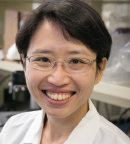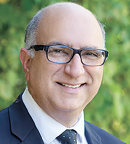Formal discussant Yvonne Chen, PhD, Associate Professor of Microbiology, Immunology, and Molecular Genetics at the University of California, Los Angeles, said the issue of toxicity was important, since high levels of toxicity were observed in this small group of five patients.

Yvonne Chen, PhD
“All five patients had at least grade 3 cytokine-release syndrome, and I suspect this may be related to the fairly high dosing levels used in this particular trial,” she noted.
The TruUCAR product was used at dosing levels of 0.6 to 1.5 × 107 cells/kg, compared with the highest dose of 0.3 × 106 cells/kg in another trial presented at the AACR Virtual Annual Meeting, which assessed an investigational dual-target chimeric antigen receptor (CAR) T-cell product, Dr. Chen noted.
“Of course, this is a bit of an apples-and-oranges comparison—different CAR constructs, different disease types, allogeneic vs autologous transplant—but I think the high T-cell dosing level could at least partly explain the high toxicities we’re seeing,” she suggested.
“The big question will be durability of response. This is something the field will watch with interest as the trial progresses beyond the 7-month monitoring period that we saw reported,” she said.
‘Not a Panacea’

Joseph Alvarnas, MD
In a separate interview, Joseph Alvarnas, MD, Vice President of Government Affairs, Senior Medical Director for Employer Strategy, and Clinical Professor, Department of Hematology and Hematopoietic Cell Transplantation, City of Hope, Duarte, California, was enthusiastic about the potential for the novel off-the-shelf CAR T-cell product because it overcomes the main limitations of conventional CAR T-cell therapy. However, he cautioned that larger trials in broader populations will be needed to determine the true toxicity and duration of expansion and persistence of these off-the-shelf CAR T cells over the longer term.
“This is not a panacea for the issues we have seen to date with CAR T-cell therapy,” Dr. Alvarnas cautioned. That being said, “this product is potentially revolutionary because it overcomes the three main limitations of CAR T-cell therapy—time delay, cost, and inability to generate expansion in vivo,” he explained.
CAR T-cell therapy derived from each patient’s T cells can take up to 7 weeks to manufacture, and during that delay, patients with aggressive leukemia or lymphoma could worsen to the point where they won’t benefit from the product. The second limitation is the very high cost per treatment—upward of $300,000 to $400,000. And the third issue is that a small number of patients cannot generate T cells and aren’t able to expand upon them once they are infused.
“The off-the-shelf product was developed using CRISPR to edit out two genes: CD7 so that the cells don’t kill themselves off and TRAC to eliminate graft-vs-host disease. Although no graft-vs-host disease was seen in this small study, all five patients did develop cytokine-release syndrome. Until we see a larger trial, we won’t know the true rate of [cytokine-release syndrome]. The idea was that an off-the-shelf product would not lead to high rates of [that response], but this study provides a clue that that might not be the case. Given the level of [cytokine-release syndrome] in this study, this product may not be suitable for outpatient treatment,” Dr. Alvarnas said. Larger studies will shed light on these issues, he noted.
DISCLOSURE: Dr. Chen is cofounder of Kalthera Therapeutics and has served in a consulting or advisory role for Gritstone Oncology and Notch Therapeutics. Dr. Alvarnas reported no conflicts of interest.

